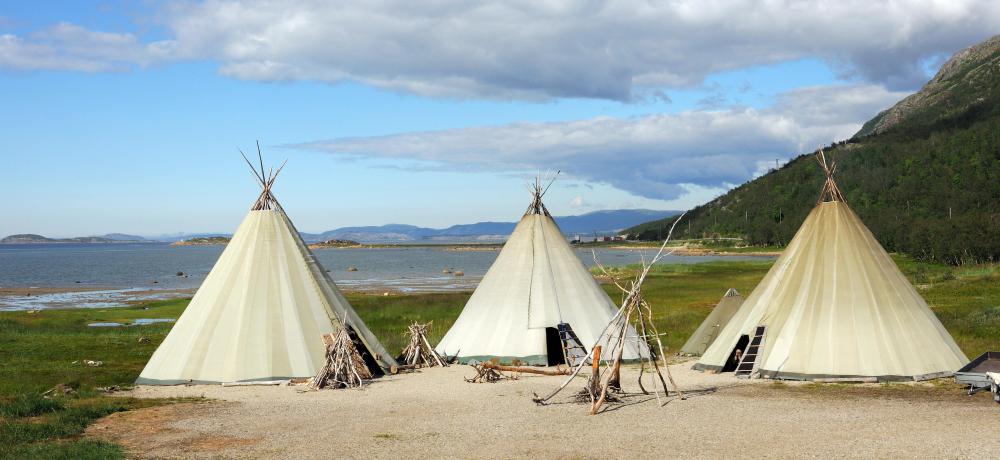At AllThingsNature, we're committed to delivering accurate, trustworthy information. Our expert-authored content is rigorously fact-checked and sourced from credible authorities. Discover how we uphold the highest standards in providing you with reliable knowledge.
What is Indian Summer?
An Indian Summer is a time of year when temperatures are considerably above normal. The term dates as far back as the early 1800s, with possible connections to early American Indian tribes, and typically is associated with a stretch of warm, quiet weather occurring in the autumn months. Though the exact circumstances that constitute a true Indian Summer are debated, most agree on a few solid aspects that define one.
Many references to an Indian Summer state that it can not occur until there has been a killing frost or freeze. While this is typically and almost exclusively a weather event that occurs in the fall, some areas have reported weather conditions applicable to an Indian Summer in the winter months.

The most commonly accepted locations for an Indian Summer to occur are the Mid-Atlantic states north to New England and west across the Ohio Valley, the Great Lakes areas, and the Midwest, as well as into the Great Plains states. Essentially, anywhere that has a defined winter season can experience one.
The weather patterns that impact and cause an Indian Summer involve large areas of high pressure along the East Coast with warm temperatures from the South and Southwest being pulled up. This results in a clockwise rotation of wind around the area of high pressure. It is possible for the warmer than normal stretch of weather to last for a few days to over a week, but it is widely agreed upon that an Indian Summer involves at least three days of such weather.

Though the term "Indian Summer" is typically reserved to refer to climatic conditions in North America, other areas, such as Europe, refer to similar seasons differently. In areas where no defined winter season or freezing occurs or is likely to occur, the term has little meaning, if any at all.
Frequently Asked Questions
What exactly is an Indian Summer?

An Indian Summer refers to a warm, calm spell of weather occurring in autumn, particularly after a frost or significant cold period. It's characterized by above-average temperatures, clear skies, and a notable absence of wind. This phenomenon typically happens in the Northern Hemisphere between late September and mid-November.
How did the term 'Indian Summer' originate?

The term 'Indian Summer' has uncertain origins, but it's believed to have been coined during the early 19th century in the United States. One theory suggests it was derived from Native American Indian weather practices, while others believe it refers to the period when First Nations people harvested their crops.
Is Indian Summer a global phenomenon?
Indian Summer is primarily a North American term, but similar weather patterns occur globally. For instance, in Europe, a comparable warm period in autumn is often called 'Old Wives' Summer' or 'St. Martin's Summer.' The occurrence and terminology vary by region, reflecting local climate patterns and cultural references.
What are the meteorological conditions that cause an Indian Summer?
An Indian Summer is typically caused by a high-pressure weather system that develops over a region, leading to clear skies and warmer temperatures. This system can draw warm air from lower latitudes or compress and warm as it descends, creating unseasonably warm conditions during the autumn months.
Can Indian Summer have any ecological impacts?
Yes, an Indian Summer can have ecological impacts. Extended warm periods can delay the dormancy of plants and trees, affecting their winter hardiness and survival. It can also disrupt the timing of migration for certain bird species and influence the behavior and lifecycle events of various wildlife, potentially impacting ecosystems.
How do meteorologists predict an Indian Summer?
Meteorologists predict an Indian Summer by analyzing weather patterns, including high-pressure systems and prevailing winds. They use satellite imagery, atmospheric models, and historical weather data to forecast extended warm periods in autumn. However, predicting the exact timing and duration of an Indian Summer can be challenging due to its somewhat sporadic nature.
AS FEATURED ON:
AS FEATURED ON:














Discussion Comments
I definitely agree about the "Indian" portion of the term "Indian Summer" as referring to "deception."
Remember, a lot of the terms and phrases used today were coined during eras when people's negative ideas about other cultures/races were reinforced rather than questioned by social practices. It may not seem fair, but they were different times; the collective mindset was different.
Anyway, it makes perfect sense that "Indian Summer" refers to a "False" or a "Deceptive Summer."
The brief period of warmth - just before true winter sets in - might lead a person (at least the first time they experience it) into the false sense that the warm weather season is setting in; but then the warmth and sunshine dissipate and snow and ice quickly replace them.
Seriously? a dishonest summer? Does that even make sense?
Where the heck was this person born? Always negative thoughts coming from negative people. Always stereotyping Indians. You need to get out in the world, this is the 21st century.
I thought that the term "Indian" in "Indian Summer" came from the stereotype that Indians were dishonest. That is, "Indian Summer" meant false summer. The old expressions, "Indian Giver" and "Honest Indian" may have had a similar source.
Post your comments